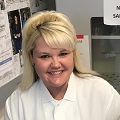Sarah L. Wallace, PhD NASA Johnson Space Center

Sarah L. Wallace, PhD NASA Johnson Space Center
Sarah Wallace received her B.S. in Biology from Wichita State University and her doctorate in Biomedical Science from the Microbiology and Immunology Department at the University of Texas Medical Branch (UTMB). While attending graduate school at UTMB, she was awarded both a Texas Space Grant Consortium Fellowship and a NASA Space Life Science Fellowship, which afforded her the opportunity to conduct much of her doctoral research in collaboration with the Microbiology Laboratory at the Johnson Space Center. In her current position with NASA Johnson Space Center, Dr. Wallace serves as a technical lead in the Microbiology Laboratory, which is responsible for mitigating infectious disease risk during human spaceflight. Her responsibilities include the assessment of microbial risk based on vehicle and mission architecture as well as crewmember, food, and environmental monitoring. These assessments are used to develop requirements for NASA and commercial spaceflight vehicles, including the International Space Station. In addition to her operational support of human spaceflight, Dr. Wallace leads new technology initiatives for her discipline with the goal of reducing Earth-dependence for complex sample analysis. She has served as PI for numerous spaceflight investigations, including those to increase off-planet molecular biology capabilities. Specifically, she has led multiple investigations to apply sequencing to microbial monitoring, which resulted in the first identification of microbes collected and cultured entirely off Earth. She is continuing to advance modern microbiome analysis off the planet with her current flight study, the Biomolecule Extraction and Sequencing Technology (BEST) payload, by implementing a culture-independent, direct swab-to-sequencer process that can be conducted completely on the ISS. Dr. Wallace’s work is also aimed at understating how the spaceflight environment impacts cellular behavior.
